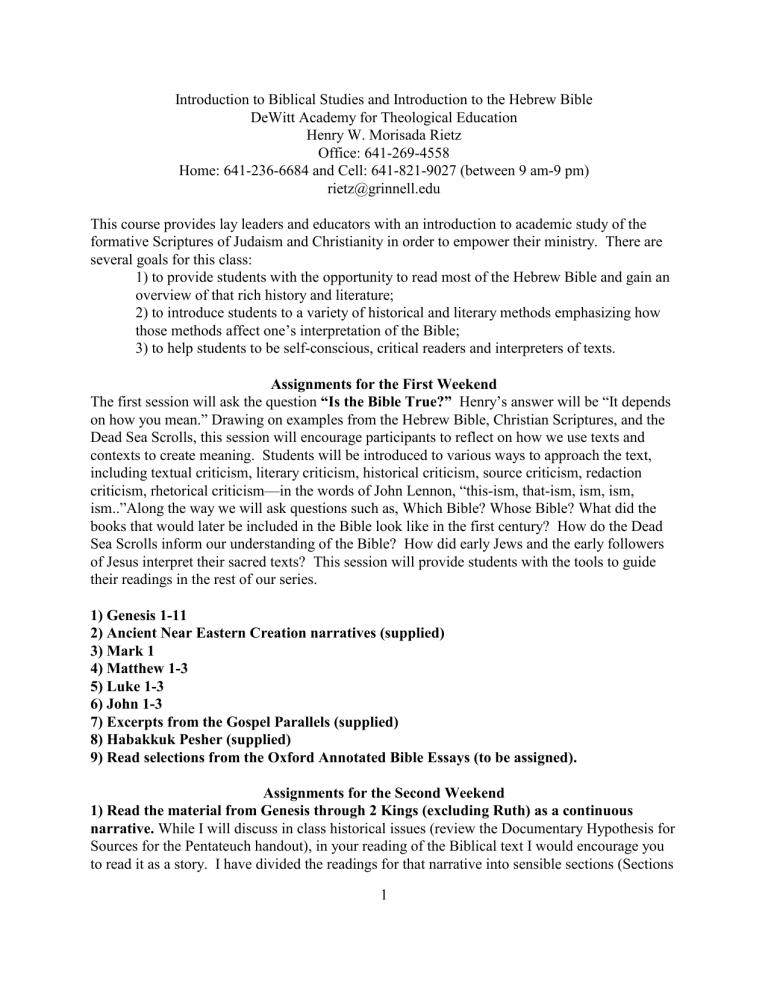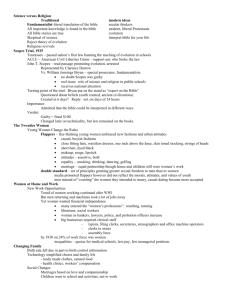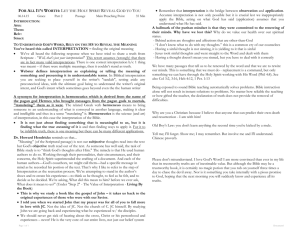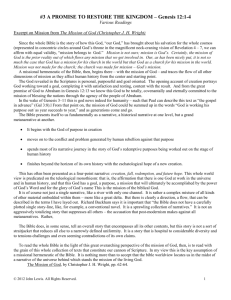REL 211: The Hebrew Bible

Introduction to Biblical Studies and Introduction to the Hebrew Bible
DeWitt Academy for Theological Education
Henry W. Morisada Rietz
Office: 641-269-4558
Home: 641-236-6684 and Cell: 641-821-9027 (between 9 am-9 pm) rietz@grinnell.edu
This course provides lay leaders and educators with an introduction to academic study of the formative Scriptures of Judaism and Christianity in order to empower their ministry. There are several goals for this class:
1) to provide students with the opportunity to read most of the Hebrew Bible and gain an overview of that rich history and literature;
2) to introduce students to a variety of historical and literary methods emphasizing how those methods affect one’s interpretation of the Bible;
3) to help students to be self-conscious, critical readers and interpreters of texts.
Assignments for the First Weekend
The first session will ask the question
“Is the Bible True?”
Henry’s answer will be “It depends on how you mean.” Drawing on examples from the Hebrew Bible, Christian Scriptures, and the
Dead Sea Scrolls, this session will encourage participants to reflect on how we use texts and contexts to create meaning. Students will be introduced to various ways to approach the text, including textual criticism, literary criticism, historical criticism, source criticism, redaction criticism, rhetorical criticism—in the words of John Lennon, “this-ism, that-ism, ism, ism, ism..”Along the way we will ask questions such as, Which Bible? Whose Bible? What did the books that would later be included in the Bible look like in the first century? How do the Dead
Sea Scrolls inform our understanding of the Bible? How did early Jews and the early followers of Jesus interpret their sacred texts? This session will provide students with the tools to guide their readings in the rest of our series.
1) Genesis 1-11
2) Ancient Near Eastern Creation narratives (supplied)
3) Mark 1
4) Matthew 1-3
5) Luke 1-3
6) John 1-3
7) Excerpts from the Gospel Parallels (supplied)
8) Habakkuk Pesher (supplied)
9) Read selections from the Oxford Annotated Bible Essays (to be assigned).
Assignments for the Second Weekend
1) Read the material from Genesis through 2 Kings (excluding Ruth) as a continuous narrative.
While I will discuss in class historical issues (review the Documentary Hypothesis for
Sources for the Pentateuch handout), in your reading of the Biblical text I would encourage you to read it as a story. I have divided the readings for that narrative into sensible sections (Sections
1
1-6). Try to read each section as a whole and then consider how the parts fit together to tell a story.
As you read, consider some of the following questions:
Can you divide each sections into two, three, or four manageable subsections?
What are the major points or themes of the individual sections?
Are there places in the narrative where those themes are questioned or critiqued?
After you consider those questions, then ask how do the sections fit together?
How does the ending of the narrative at the end of 2 Kings affect your interpretation of the whole?
At times, I have emphasized particular passages by placing them in parentheses. You may skim the material between those sections, but have a sense of what is there.
2) Fill out in writing the attached “Worksheet of major stories in Genesis through 2 Kings
(excluding Ruth).”
3) Read the introductions to the various sections and books in your New Oxford Annotated
Bible (e.g. “Introduction to the Pentateuch” beginning on page 3 Hebrew Bible; the introduction to “Genesis” beginning on page 9 Hebrew Bible; and so forth).
Section 1: Review the Primeval History (Gen 1-11) and Ancestral Narratives (Gen 12-50)
Assignment: Genesis; Ancient Near Eastern Creation narratives (supplied)
Section 2: Exodus and the Torah
Assignment: Exodus-Leviticus (esp. Ex 1-24, 31:18-34:35, 40:1-38; Lev 16-19)
Section 3: Wilderness and Conquest
Assignment: Leviticus-Joshua (esp. Num 10:11-14:45, 27:12-23; Deut 1-12,
29-34; Josh 1-11, 23-24)
Section 4: Judges and the Rise of the Monarchy
Assignment: Judges, 1 Sam, (esp. Judges 1-5, 19-21; 1Sam 7:15-12; 15-24; 31)
Section 5: Monarchy and Divided Monarchy
Assignment: 2 Samuel, 1-2 Kings, (esp. 2Sam 1-3:1; 5-13; 22-23; 1Kings 1-16)
Section 6: Divided Monarchy (cont'd) and Rise of Prophecy
Assignment: 1-2 Kings, Amos, Hosea (esp. 1Kings 17-21; 2Kings 2-11, 17-20;
Amos; Hosea)
Assignment for the Third Weekend
Section 7: Prophecy and the Pre-Exilic Period
Assignment: Isaiah 1-39; Jeremiah; 1 Kings 22-25 and (esp. Isa 1-12, 28-33; Jer 1-6, 18-
20, 26-31; 1Kings 22-25)
Section 8: Exilic Period
Assignment: Isaiah 40-55, Ezekiel, Lamentations (esp. Ezek 1-6, 16-18, 36-37, 40-48; Isa
40-47, 50-55; Lam 1-5)
Section 9: Post-Exilic Period, Beginning of the Second Temple Period
Assignment: Isaiah 56-66; Chronicles; Ezra-Nehemiah; Jonah; (esp. Isa 60-66; 1Chron
13-16; 2 Chron 36; Ezra 7-10; Neh 8-10; Jonah)
Section 10: Ruth; Esther; Song of Songs; Psalms
2
Assignment: Ruth; Esther; Song of Songs; Psalms
Section 11: Wisdom Literature: Proverbs, Ecclesiastes, and Job
Assignment: Proverbs; Ecclesiastes; and Job (esp. Prov 1-3, 8-9, 31; Eccl 1-3, 12; Job)
Section 12: Rise of Apocalypticism
Assignment: Daniel
Final Project: A “map” of the stories and history of the Hebrew Bible (details will be explained in class the first week).
Required Books:
Michael D. Coogan et al ., ed. The New Oxford Annotated Bible: New Revised Standard Version with the Apocryphal/Deuterocanonical Books, 4 th edition.
Oxford: Oxford University
Press, 2010. ISBN 9780195289602
Ancient Near Eastern Creation Narratives packet (to be supplied)
Documentary Hypothesis for Sources for the Pentateuch (to be supplied)
3
Worksheet of major stories in Genesis through 2 Kings (excluding Ruth)
Using name of the book, chapter and verse numbers, identify where in the narrative the following stories begin and end:
Creation stories
Cain and Abel
Flood
Abraham and Sarah
Isaac and Rebeccah
Jacob
Joseph
Call of Moses/Burning Bush
Departure from Egpyt
Arrival at Sinai
Departure from Sinai
What do the people do after they depart from Mount Sinai?
When do the people arrive in the land?
When does manna cease?
Conquest of the land
Story of the time when Israel is ruled by judges
Who is the first judge? Where in the bible does his/her reign begin?
Who is the last judge? Where in the bible does his/.her reign end?
Story of the time when the nation is ruled by kings.
Who is the first king?
4
Where in the bible does his reign begin and end?
Who is the second king?
Where in the bible does his reign begin and end?
Who is the third king?
Where in the bible does his reign begin and end?
Where is story about the building and dedication of the Temple?
What happens after the reign of the third king?
Where in the bible is the story of the conquest of the northern kingdom of Israel by the
Assyrians?
Where in the bible is the story of the conquest of the southern kingdom of Judah by the
Babylonians?
5








